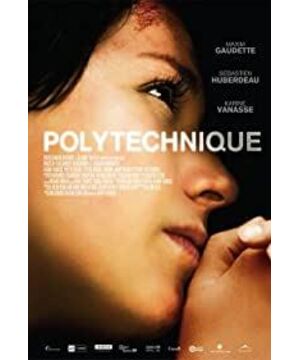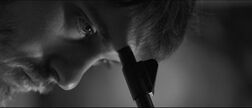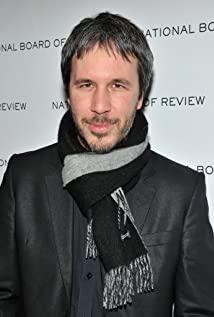At the beginning of the movie, the photocopying room was crowded with male and female students. Everyone was busy printing homework and handouts. The two female students near the camera were chatting and using the photocopier, presenting a noisy atmosphere. It was an ordinary Ukiyo-e on campus. Suddenly, there was a huge gunshot from nowhere. One of the female students’ cheeks was stained with blood. Her expression was dazed, she didn’t know what was going on, and she wandered unsteadily. . This kind of opening not only shocked all the audience, but also clearly conveyed the fright of those present at the time, as well as the sudden loss of Zhang Huang: What happened?
Then, the camera goes back to the man (Maxim Gaudette) who committed the case before the incident. The open windows showed every move of the woman facing the street. The man took out a pen and paper to write down his confession word by word. Through the man’s voice, the audience could understand his serious anti-social mentality, especially his dislike of women: unbearable Many feminists vigorously advocate the outstanding performance of women, and cannot accept that women and men contribute to the same in the war. In short, they cannot recognize all the contributions women have made to society. However, what’s interesting is that on the walls of his room and kitchen, there are calendars and posters with females as the main image. Before committing the crime, he even drove to his mother’s house, looking at his mother from a distance, and writing down the opposite. Mother's apology. There seems to be a strange relationship between this man and woman that is difficult to clarify, hateful and intimate.
In the "Montreal School Massacre Incident Book", the man’s growing up background was not described, so it is such an anti-feminist person who is presented in front of the audience. This arrangement actually has a different meaning. Even if a pseudonym is used to protect the parties involved, all the main characters in the movie have their own names, but the name of the killer never appears from beginning to end. For this reason, I paid special attention to the list of staff and actors after the film ended, and it was really only "The Killer" in the name. Director Danny Villeneuve may want to use this killer to satirize all men. Even though he advocates gender equality on the surface, he actually cannot admit that women have the same abilities as themselves, or even superior to men. Just as when the female student Vallechdonpiye (Karine Vanasse) went to the interview, the examiner pointed out that considering the part of getting married and raising children, few women would do aerospace engineering. It wasn't until Valoxi informed that he had no plans to have children before he was successfully hired. This not only reflects the unequal treatment of men and women in occupation, but also shows that men use sovereignty to squeeze women. However, sometimes men do need to ask women for help. Before the class, Jeff (played by Sébastien Huberdeau) because of something he didn't understand in his schoolwork, he borrowed his notebook from Valech to make a copy.
In fact, 20 years after the "Montreal School Massacre", men and women still cannot achieve equal status in all aspects. In addition to the differences caused by innate, it is more from people's established stereotypes. impression. Although director Danny Villeneuve used the various phenomena mentioned in the previous paragraph to point out the inequality between men and women, he did not intend to provoke unnecessary wars between the sexes. When the killer raised his gun to commit suicide and fell down, the audience looked down and saw that the blood of the killer and the blood of the female student on the side merged together slowly. It seemed that they wanted to make this war between men and women ── like the wall of a photocopying room. The war depicted in the painting Guernica (1937) by Pablo Ruiz Picasso (1881-1973)—reconciled here. In addition, director Danny Villeneuve divided the incident from the perspective of two survivors, Jeff and Valerhi, to let the audience understand the immediate reaction of men and women in the face of the tragedy, as well as the psychological construction and afterwards. The difference in growth brings out the destruction of men "overcoming rigidity with strength" and the strength of women "overcoming rigidity with softness".
From the perspective of expression methods, "Montreal School Massacre Incident Book" discards all colors and returns the images to simple black and white colors, which not only creates a documentary-like atmosphere, but also allows the audience to focus on the movie story. itself. Such a method is still the same as the Chinese film "No Puedo Vivir Sin Ti" (No Puedo Vivir Sin Ti, 2009), which is also based on social cases in recent years. On the contrary, it strengthens the power of the image and makes people have to reflect on the issues raised in the film. In addition, there are many upside-down scenes in the movie--like looking upside down from the air on the floating ice on the river, and the upside-down and forward corridor at the end--reminding the audience that you can actually change the angle of the world and try to get rid of the long time. From a male-dominated viewpoint, viewing from a brand new female perspective, different landscapes may appear.
At the end, through the letter written by Valois to the killer's mother, it points out the amazing fact: it turns out that being pregnant and facing the killer gave her the same level of fear. This is a very ironic thing. Being pregnant should be happy to welcome a new life, but because of the status of a pregnant woman, her aerospace engineering work is threatened, and again pointed out the pressure and inequality faced by women in a masculine society. After slowly standing up from his fear, Walasse said, "If you are born a boy, I will teach him how to love; if it is a girl, I will tell her that the world belongs to her." Eliminate male discrimination with love , To build a world of women with confidence. Fortunately, after the heavy incident, director Danny Villeneuve still gave us an open and bright future.
View more about Polytechnique reviews











